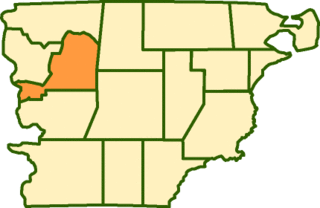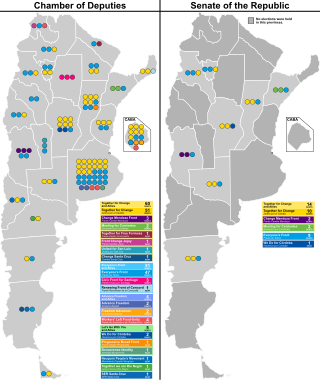
Since its return to democracy in 1990, Chile has been an active participant in the regional and international arena. Chile assumed a two-year non-permanent position on the UN Security Council in January 2003 and was re-elected to the council in October 2013. It is also an active member of the UN family of agencies, serving as a member of the Commission on Human Rights and participating in UN peacekeeping activities. Chile hosted the second Summit of the Americas in 1998, was the chair of the Rio Group in 2001, hosted the Defense Ministerial of the Americas in 2002, and the APEC summit and related meetings in 2004. In 2005 it hosted the Community of Democracies ministerial conference. It is an associate member of Mercosur and a full member of APEC. The OECD agreed to invite Chile to be among four countries to open discussions in becoming an official member.
Argentina is divided into twenty-three federated states called provinces and one called the autonomous city of Buenos Aires, which is the federal capital of the republic as decided by the Argentine Congress. The provinces and the capital have their own constitutions, and exist under a federal system.

The Tehuelche people, also called the Aónikenk, are an indigenous people from eastern Patagonia in South America. In the 18th and 19th centuries the Tehuelche were influenced by Mapuche people, and many adopted a horseriding lifestyle. Once a nomadic people, the lands of the Tehuelche were colonized in the 19th century by Argentina and Chile, gradually disrupting their traditional economies. The establishment of large sheep farming estates in Patagonia was particularly detrimental to the Tehuelche. Contact with outsiders also brought in infectious diseases ushering deadly epidemics among Tehuelche tribes. Most existing members of the group currently reside in cities and towns of Argentine Patagonia.

Languiñeo Department is a department of Chubut Province in Argentina.
28 de Julio is a village and municipality in Gaiman Department, Chubut Province in southern Argentina, and is west of the lower Chubut River. To its east is Dolavon, to its north is National Route 25, to its south is a boundary, and to its west is Boca Toma. The economy in the village is primarily agricultural.
Carrenleufú is a village and municipality in Chubut Province in southern Argentina.
El Escorial (Chubut) is a village and municipality in Chubut Province in southern Argentina.
El Mirasol is a village and municipality in Chubut Province in southern Argentina.

El Hoyo is a village and municipality in Chubut Province in southern Argentina.

Gobernador Costa (Chubut) is a village and municipality in Chubut Province in southern Argentina.

Los Altares is a rural commune in Paso de Indios Department, Chubut Province in southern Argentina. As of 2001, it had 123 inhabitants. Mario Oviedo is the municipality's leader, with the title Presidente Junta Vecinal.
Quinta El Mirador is a village and municipality in Chubut Province in southern Argentina.

The Comodoro Rivadavia and Colonia Sarmiento Railway was an Argentine railway company that built and operated a broad gauge line that connected the port of Comodoro Rivadavia with Colonia Sarmiento in Chubut Province. The FCCRCS -belonging to Argentine State Railway- also connected to Central Chubut Railway.

The fourth government of Felipe González was formed on 14 July 1993, following the latter's election as Prime Minister of Spain by the Congress of Deputies on 9 July and his swearing-in on 13 July, as a result of the Spanish Socialist Workers' Party (PSOE) emerging as the largest parliamentary force at the 1993 Spanish general election. It succeeded the third González government and was the Government of Spain from 14 July 1993 to 6 May 1996, a total of 1,027 days, or 2 years, 9 months and 22 days.

We Are All Chubut is a provincial political party in the Chubut Province of Argentina. It was formed in 2014 to back the candidacy to the governorship of former governor Mario Das Neves. The party split from the provincial branch of the Justicialist Party.

Legislative elections were held in Argentina on 14 November 2021. Half of the seats in the Chamber of Deputies and a third of the seats in the Senate were renewed. The election had previously been scheduled to take place on 24 October 2021, but was postponed due to the COVID-19 pandemic in Argentina.

Ignacio Agustín "Nacho" Torres is an Argentine politician, currently serving as a National Senator for Chubut. A member of Republican Proposal (PRO), Torres was elected in 2021 and sits in the Juntos por el Cambio parliamentary inter-bloc. He previously served as a National Deputy from 2019 to 2021.

Nancy Susana González is an Argentine politician, who was a National Senator for Chubut from 2015 to 2021 and a National Deputy from 2006 to 2013. She belongs to the Justicialist Party.

Juan Mario Pais is an Argentine politician, who was a National Senator for Chubut from 2015 to 2021 and a National Deputy from 2007 to 2015. He belongs to the Justicialist Party.
















